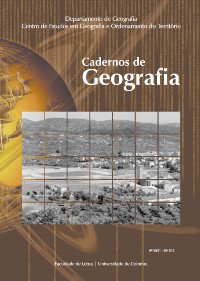Please use this identifier to cite or link to this item:
https://hdl.handle.net/10316.2/30224| DC Field | Value | Language |
|---|---|---|
| dc.contributor.author | Sant´Anna Neto, João Lima | - |
| dc.date.accessioned | 2014-06-03T16:41:05Z | |
| dc.date.accessioned | 2020-09-21T21:02:59Z | - |
| dc.date.available | 2014-06-03T16:41:05Z | |
| dc.date.available | 2020-09-21T21:02:59Z | - |
| dc.date.issued | 2012 | - |
| dc.identifier.issn | 0871-1623 | - |
| dc.identifier.uri | https://hdl.handle.net/10316.2/30224 | - |
| dc.description.abstract | Este artigo pretende contribuir para a discussão teórica sobre a relação entre o clima e a cidade numa perspectiva geográfica em que se propõe a possibilidade de se considerar o clima urbano como uma construção social. Por não termos a capacidade de lidar com as grandes catástrofes, por variadas limitações, a humanidade optou por resignar-se aceitando a vulnerabilidade diante dos eventos de grande magnitude. As cidades, como espaços produzidos, ao mesmo tempo em que criam oportunidades civilizatórias, também se transformam em armadilha ambiental. Se a cidade é o habitat da modernidade, se os sistemas urbanos são altamente complexos e desiguais e, se a atmosfera urbana é o produto da interação entre as variáveis do clima e as intervenções socioeconômicas, então os diversos grupos sociais não experimentam nem se relacionam com o tempo e o clima urbano da mesma forma. Nesta perspectiva, tem-se que admitir que o clima urbano possa ser interpretado como uma construção social. | por |
| dc.description.abstract | Cet article vise à contribuer à la discussion théorique à propos de la relation entre le climat et la ville dans une perspective géographique qui propose la possibilité de considérer le climat urbain comme une construction sociale. En considérant qu’on n’a pas la capacité de gérer les catastrophes majeures à cause des limitations, l’humanité a choisi de se résigner à accepter la vulnérabilité aux événements de grande ampleur. Les villes, comme des espaces produits, au même temps de créer des possibilités civilisatrices, deviennent aussi prises au piège environnementale. Si la ville est l’habitat de la modernité, si les systèmes urbains sont très complexes et inégales, et si l’ambiance urbaine est le produit de l’interaction entre les variables climatiques et les interventions socio-économiques, alors les différents groupes sociaux ne connaissent pas ni se rapportent pas à la météo et le climat urbain de la même manière. Dans cette perspective, on doit admettre que le climat urbain peut être interprété comme une construction sociale. | fra |
| dc.description.abstract | This article aims to contribute to the theoretical discussion about the relationship between climate and the urban space in a geographical perspective that proposes the possibility of considering the urban climate as a social construction. Why not has the capacity to handle major disasters for a variety of limitations, humanity has chosen to resign themselves to accepting vulnerability to events of great magnitude. Cities, as produced spaces at the same time create civilization opportunities also become trapped environment. If the city is the home of modern, if urban systems is highly complex and uneven, and if the urban atmosphere is the product of interaction between climate variables and socioeconomic interventions, then the various social groups do not experience or relate to urban weather and climate of the same way. In this perspective, one has to admit that the urban climate can be interpreted as a social construction. | eng |
| dc.language.iso | por | - |
| dc.publisher | Faculdade de Letras da Universidade de Coimbra, Departamento de Geografia | - |
| dc.subject | Urban climate | eng |
| dc.subject | Climate risk | eng |
| dc.subject | Public health | eng |
| dc.subject | Production of space | eng |
| dc.subject | Climat urbain | fra |
| dc.subject | Risque climatique | fra |
| dc.subject | Santé publique | fra |
| dc.subject | Production de l’espace | fra |
| dc.subject | Clima urbano | por |
| dc.subject | Risco climático | por |
| dc.subject | Saúde pública | por |
| dc.subject | Produção do espaço | por |
| dc.title | O clima como risco, as cidades como sistemas vulneráveis, a saúde como promoção da vida | por |
| dc.title.alternative | Le climat comme risque, les villes comme systèmes vulnérables, la santé comme la promotion de la vie | por |
| dc.title.alternative | Climate as risk, cities as vulnerable systems, health as promotion of life | por |
| dc.type | article | - |
| uc.publication.collection | Cadernos de Geografia nº 30-31 | - |
| uc.publication.firstPage | 215 | - |
| uc.publication.issue | 30-31 | - |
| uc.publication.lastPage | 227 | - |
| uc.publication.location | Coimbra | - |
| uc.publication.journalTitle | Cadernos de Geografia | - |
| dc.identifier.doi | 10.14195/0871-1623_31_19 | - |
| uc.publication.section | Eixo 2: Dinâmicas geo-humanas de territórios em mudança | - |
| uc.publication.orderno | 19 | - |
| uc.publication.area | Ciências Sociais | - |
| uc.publication.manifest | https://dl.uc.pt/json/iiif/10316.2/30224/232075/manifest?manifest=/json/iiif/10316.2/30224/232075/manifest | - |
| uc.publication.thumbnail | https://dl.uc.pt/retrieve/11465280 | - |
| item.grantfulltext | open | - |
| item.fulltext | With Fulltext | - |
| Appears in Collections: | Cadernos de Geografia | |
Files in This Item:
| File | Description | Size | Format | |
|---|---|---|---|---|
| cg30-31_artigo20.pdf | 6.24 MB | Adobe PDF |  |
Items in DSpace are protected by copyright, with all rights reserved, unless otherwise indicated.
